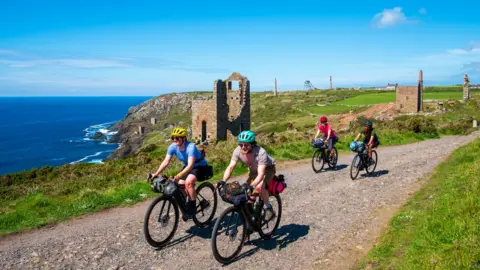New cycle route to explore 'lost and forgotten' west Cornwall
 Jordan Gibbons/Pannier/Cycling UK
Jordan Gibbons/Pannier/Cycling UKA new cycle route in West Cornwall traverses the "lost lanes and forgotten ways" of bronze age mining paths and rugged coastlines.
The West Kernow Way has been developed by charity Cycling UK, winding its way in a 150-mile (230km) figure of eight.
Landmarks along the route include the Botallack tin mines, the Bronze Age monument Men-an-Tol, Land's End, St Michael's Mount and Lizard Point.
The charity estimates the route will take three to four days to complete.
 Jordan Gibbons/Pannier/Cycling UK
Jordan Gibbons/Pannier/Cycling UK Jordan Gibbons/Pannier/Cycling UK
Jordan Gibbons/Pannier/Cycling UKThe West Kernow Way was launched to coincide with the Tour of Britain in Cornwall.
Cycling UK worked for more than a year to develop the route and said it involves a total climb of 4.2km (2.6 miles).
 Jordan Gibbons/Pannier/Cycling UK
Jordan Gibbons/Pannier/Cycling UKRoute preparation included reclaiming some of the lost paths along the Tinners Way.
This 18-mile (29km) trail runs from St Ives to Cape Cornwall and has its origins in the Bronze Age, being used more recently as an important highway in the mining boom of the 18th and 19th Centuries.
 Jordan Gibbons/Pannier/Cycling UK
Jordan Gibbons/Pannier/Cycling UKSophie Gordon, who spearheaded Cycling UK's creation of the West Kernow Way, said it traversed "through lost lanes and forgotten ways", allowing people to experience Cornwall's "rugged beauty, its history and culture".
She said: "Collating the necessary evidence to upgrade omissions made back in the fifties has required sifting through old journals and maps decades if not centuries old."

Follow BBC News South West on Twitter, Facebook and Instagram. Send your story ideas to [email protected]
